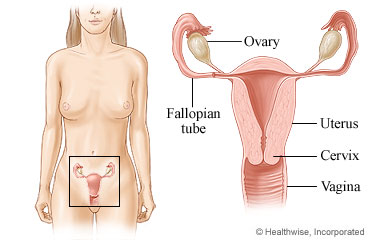Overview
The hymen is the thin tissue around the opening to the vagina. Usually the hymen has an opening. This lets menstrual blood pass through the vagina.
In rare cases, the hymen does not have an opening. This is called an imperforate hymen. Doctors often diagnose it around puberty, when symptoms of pain and pressure in the pelvic area may start to occur. This is caused by the backed-up menstrual blood.
To treat it, your doctor will make an opening in the hymen. This will let the blood drain.
Follow-up care is a key part of your treatment and safety. Be sure to make and go to all appointments, and call your doctor if you are having problems. It's also a good idea to know your test results and keep a list of the medicines you take.


